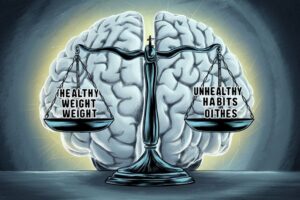What is The Role of Cognitive Behavioral Therapy in Sustainable Weight Loss?
Cognitive Behavioral Therapy (CBT) has emerged as a powerful tool in the realm of sustainable weight loss, offering a unique approach that goes beyond traditional diet and exercise regimens.
By addressing the interconnectedness of thoughts, feelings, and behaviors, CBT aims to not only assist individuals in shedding excess pounds but also in fostering long-lasting lifestyle changes.
This article delves into the pivotal role that CBT plays in weight management, exploring its principles, techniques, and impact on psychological factors influencing weight loss success.
Through the examination of case studies and future considerations, we seek to illuminate the transformative potential of integrating CBT into comprehensive weight loss programs for sustainable and enduring results.

Table of Contents
ToggleIntroduction to Cognitive Behavioral Therapy (CBT)
Cognitive Behavioral Therapy (CBT) is a widely researched and scientifically proven approach to psychotherapy that focuses on the relationship between thoughts, feelings, and behaviors. Developed in the 1960s by Dr. Aaron Beck, CBT is based on the premise that our thoughts impact our emotions and behaviors, and by changing our negative or distorted thoughts, we can improve our mental health.
CBT is a goal-oriented and structured form of therapy that emphasizes identifying and challenging irrational beliefs and cognitive distortions in order to develop more adaptive ways of thinking and coping with life stressors.
One of the key features of CBT is its collaborative and problem-solving approach, where the therapist and client work together to identify specific goals and develop strategies to achieve them.
CBT is typically a short-term therapy that is highly effective in treating a wide range of mental health conditions, including depression, anxiety disorders, and substance abuse.
Research has shown that CBT is as effective as medication in treating certain psychological disorders and can lead to long-lasting improvements in mental well-being.
Overall, CBT is a versatile and practical therapy that helps individuals learn new skills and techniques to manage their thoughts and emotions effectively.
Read more about “How to Recognize Toxic Patterns in Your Relationship and Ways to Overcome?”
Relationship Between CBT and Weight Loss
Cognitive Behavioral Therapy (CBT) is a well-established form of psychotherapy that focuses on changing negative thought patterns and behaviors to promote mental health and well-being.
In recent years, researchers have also examined the relationship between CBT and weight loss, particularly in the context of addressing emotional eating and promoting healthy habits.
Studies have shown that CBT can be an effective tool in helping individuals make sustainable changes in their eating habits and attitudes towards food, leading to weight loss and improved overall health outcomes.
One way in which CBT can aid in weight loss is by helping individuals identify and challenge their negative thought patterns and beliefs about food and body image.

By working with a therapist to address underlying emotional issues that may be driving unhealthy eating behaviors, individuals can develop a more positive relationship with food and make healthier choices.
CBT also helps individuals develop coping strategies for dealing with stress and emotional triggers that may lead to overeating, allowing them to develop healthier habits and achieve their weight loss goals.
Additionally, CBT can help individuals develop mindfulness skills, which can be beneficial in promoting healthier eating habits. By practicing mindfulness and being more present in the moment, individuals can become more aware of their eating patterns and make conscious choices about what and how much they eat.
This heightened awareness can help individuals break free from mindless eating habits and make more conscious decisions about their food intake, ultimately leading to weight loss and improved overall health.
Overall, the relationship between CBT and weight loss is a promising area of research that suggests that psychotherapy can play a valuable role in helping individuals achieve their weight loss goals and improve their overall well-being.
Read more about “5 Common Causes of Rhabdomyolysis and How to Avoid Them”
Overview of CBT Principles and Techniques
Cognitive behavioral therapy (CBT) is a psychotherapy approach that has been proven effective in helping individuals achieve weight loss goals. CBT principles focus on identifying and modifying negative thought patterns and behavioral changes that contribute to overeating or unhealthy eating habits.
Techniques such as cognitive restructuring, behavioral activation, and mindfulness are commonly used in CBT to help individuals develop healthier eating habits and improve their relationship with food.
In CBT, individuals are taught to challenge and change negative thoughts and beliefs that contribute to emotional eating or binge eating behaviors. By using cognitive restructuring techniques, individuals can learn to identify and challenge their irrational thoughts about food and body image.
Behavioral activation involves setting specific, achievable goals related to food intake, exercise, and self-care, and gradually increasing engagement in these activities.
Mindfulness techniques are also utilized to help individuals become more aware of their eating habits and emotions related to food, allowing them to make more conscious choices about their food intake.
Overall, CBT principles and techniques provide individuals with the tools needed to make sustainable changes in their eating habits and improve their overall health and well-being.
How CBT Addresses Unhealthy Eating Habits and Behaviors?
Cognitive Behavioral Therapy (CBT) is a therapeutic approach that addresses unhealthy eating habits and behaviors by focusing on the connection between thoughts, feelings, and actions.
In CBT, individuals learn to identify negative thought patterns and beliefs that contribute to their unhealthy eating habits, such as self-criticism, perfectionism, or emotional eating.
Through cognitive restructuring, they are taught to challenge and change these thoughts to more rational and positive ones. By gaining awareness of the underlying emotions and triggers for their unhealthy eating, individuals can develop healthier coping mechanisms and behavioral strategies.

CBT also utilizes behavioral techniques to help individuals develop new habits and skills to promote healthier eating behaviors. This may include implementing meal planning, setting realistic goals, practicing mindful eating, and learning effective communication and assertiveness skills to navigate social situations or triggers that may lead to overeating.
By gradually exposing individuals to challenging situations and helping them develop alternative coping strategies, CBT aims to shift their relationship with food and foster sustainable, long-term changes in their eating behaviors.
Overall, CBT provides a comprehensive and evidence-based approach to addressing unhealthy eating habits by addressing the underlying thoughts, emotions, and behaviors that contribute to them, enabling individuals to develop healthier attitudes and practices around food.
Read more about “How to Preserve Your Mental Health from Toxic Relationship Patterns?”
Importance of Addressing Underlying Emotional Issues in Weight Loss
When addressing weight loss, it is crucial to consider and examine the underlying emotional issues that may be contributing to one’s struggle with maintaining a healthy weight.
Emotional issues such as stress, anxiety, depression, and low self-esteem can often lead to overeating, poor food choices, and a lack of motivation to exercise.
By identifying and addressing these emotional issues, individuals can gain a deeper understanding of their eating habits and make lasting changes that promote a healthier lifestyle.
Therapy, support groups, and mindfulness techniques can be effective tools in helping individuals address and overcome these emotional barriers to weight loss.
Furthermore, addressing underlying emotional issues in weight loss can lead to more sustainable and long-term success. Instead of focusing solely on diet and exercise, individuals can work towards developing healthier coping mechanisms and self-care practices that support mental and emotional well-being.
By working with a therapist or counselor, individuals can learn to challenge negative thought patterns, develop healthier relationships with food, and build self-esteem and confidence.
This holistic approach to weight loss not only promotes physical health but also leads to improved mental and emotional well-being, ultimately leading to a more balanced and fulfilling life.
Implementing CBT Techniques for Weight Management
Cognitive Behavioral Therapy (CBT) is a widely used therapeutic approach that has shown great effectiveness in the treatment of various psychological and behavioral issues, including weight management.
When implementing CBT techniques for weight management, it is important to first assess and identify the underlying thoughts, beliefs, and emotions that are contributing to unhealthy eating habits and lifestyle choices.
By addressing these cognitive distortions and negative emotions, individuals can gain a better understanding of their relationship with food and develop healthier coping mechanisms to manage stress and emotional triggers that may lead to overeating.
In addition to targeting cognitive factors, CBT techniques for weight management also focus on modifying maladaptive behaviors and promoting positive lifestyle changes.

This can include developing a structured meal plan, setting realistic goals, and practicing mindful eating to increase self-awareness and self-control.
By incorporating techniques such as journaling, cognitive restructuring, and behavior modification, individuals can learn to challenge and change unhealthy thought patterns, build healthier habits, and ultimately achieve sustainable weight loss and long-term success in managing their weight.
Overall, implementing CBT techniques for weight management offers a holistic and evidence-based approach that addresses both the psychological and behavioral aspects of weight loss, making it a valuable tool for those people who want to enhance their overall health and well-being.
Role of CBT in Promoting Long-term Sustainable Weight Loss
Cognitive Behavioral Therapy (CBT) has emerged as a valuable tool in promoting long-term sustainable weight loss. By addressing the root causes of unhealthy eating habits and promoting positive behavior change, CBT helps individuals develop a healthier relationship with food and exercise.
CBT techniques such as self-monitoring, goal-setting, and challenging negative thoughts and beliefs around food and body image can help individuals make lasting changes to their lifestyle and maintain weight loss in the long term.
In addition, CBT can help individuals identify triggers for overeating or emotional eating and develop healthier coping mechanisms to deal with these triggers, ultimately leading to more sustainable weight loss.
Furthermore, CBT can also address underlying psychological issues such as depression, anxiety, or low self-esteem that may contribute to weight gain and hinder weight loss efforts.
By addressing these psychological factors, CBT can help individuals overcome emotional barriers to weight loss and develop a more positive self-image, which can have a profound impact on their ability to achieve and maintain a healthy weight.
Overall, the role of CBT in promoting long-term sustainable weight loss is crucial, as it provides individuals with the necessary tools and strategies to make lasting changes to their behavior, mindset, and lifestyle, leading to improved overall health and well-being.
How to Control Emotional Eating and Manage Stress with Cognitive Behavioral Therapy?
Cognitive Behavioral Therapy (CBT) is a widely used approach in addressing emotional eating and stress management. Emotional eating is a common phenomenon in which individuals eat in response to their emotions, rather than hunger. Stress and negative emotions can often trigger this behavior, leading to unhealthy eating habits and weight gain.
CBT aims to modify the thoughts and behaviors that lead to emotional eating. By identifying triggers and patterns associated with emotional eating, individuals can learn to develop healthier coping mechanisms and strategies to manage their emotions in a more constructive manner.

Furthermore, Cognitive Behavioral Therapy (CBT) can help effectively manage stress. Stress is a common factor in today’s fast-paced society and can have detrimental effects on both physical and mental health.
Through CBT, individuals can learn to recognize maladaptive thought patterns and behaviors that contribute to stress and develop more positive and effective coping mechanisms.
By addressing underlying issues and teaching individuals how to reframe their thoughts and responses to stress, CBT can help individuals to better manage and reduce stress levels, leading to improved overall well-being.
In short, CBT is a valuable tool in addressing emotional eating and stress management, as it provides individuals with the skills and strategies to identify and overcome negative patterns of thinking and behavior, leading to improved emotional and physical health.
Psychological Factors Impacting Weight Loss Success
Achieving success in weight loss is a complex process that is influenced by various psychological factors. One such factor is motivation, which plays a crucial role in sustaining behavior change and adherence to a weight loss regimen.
Individuals who are intrinsically motivated and have clear, achievable goals are more likely to experience successful weight loss outcomes. Additionally, self-efficacy, or one’s belief in their ability to achieve a desired outcome, plays a significant role in weight loss success.

Those who have a strong sense of self-efficacy are more likely to persevere through challenges and setbacks, ultimately leading to greater success in achieving and maintaining a healthy weight.
Psychological factors such as emotional eating, stress, and body image issues can also impact an individual’s ability to lose weight successfully. By addressing and managing these psychological factors, individuals can enhance their chances of achieving long-term weight loss success.
Success Stories of Individuals Who Have Used CBT for Weight Loss
Cognitive Behavioral Therapy (CBT) has been increasingly recognized as an effective tool for weight loss. One success story is that of Sarah, a 35-year-old woman who struggled with emotional eating and yo-yo dieting for years.
After seeking help from a CBT therapist, Sarah learned to identify and challenge her negative thought patterns and develop healthy coping strategies for dealing with stress.
Through CBT, she was able to reframe her beliefs about food and learn to respond to emotions without turning to food for comfort. As a result, Sarah lost over 50 pounds and has successfully maintained her weight loss for over two years.
Another inspiring success story is that of John, a 45-year-old man who had struggled with obesity for most of his adult life. After attending CBT sessions focused on behavior modification and goal setting, John was able to implement lasting changes to his eating and exercise habits.
With the help of his therapist, John identified triggers for his overeating and developed strategies to address them without resorting to unhealthy behaviors. Through his dedication to the CBT process, John was able to lose over 100 pounds and improve his overall health and well-being.
These success stories illustrate the powerful impact that CBT can have on weight loss and provide hope for others who may be struggling with similar challenges.
Benefits of Combining CBT with other Weight Loss Strategies
Combining Cognitive Behavioral Therapy (CBT) with other weight loss strategies can be highly beneficial in achieving long-term success in weight management. CBT helps individuals to identify and challenge negative thoughts and behaviors that may be hindering their progress towards weight loss goals.
By addressing underlying psychological issues such as emotional eating, self-sabotage, and low self-esteem, individuals can develop healthier habits and attitudes towards food and body image.
When combined with other weight loss strategies such as exercise, nutrition counseling, and accountability support, CBT can enhance motivation and sustainability in reaching weight loss goals.
Additionally, CBT can also help individuals to develop coping skills and strategies to handle difficult situations and setbacks that may arise during their weight loss journey.
By learning how to effectively manage stress, emotional triggers, and self-critical thoughts, individuals can better navigate the challenges of weight loss and maintain healthy habits in the long run.
This holistic approach to weight management not only addresses the physical aspects of weight loss but also the emotional and psychological factors that play a significant role in one’s relationship with food and body image.
Overall, combining CBT with other weight loss strategies can provide a comprehensive and personalized approach to weight management that promotes lasting and sustainable results.
Tips for Finding a Qualified CBT Therapist for Weight Loss
Cognitive-behavioral therapy (CBT) has been shown to be an effective tool for weight loss by addressing the underlying psychological factors that contribute to overeating and unhealthy eating habits.
When seeking a qualified CBT therapist for weight loss, it is important to consider their experience and credentials in using CBT techniques specifically for addressing weight-related issues.
Look for therapists who have specialized training in CBT for weight loss or who have a track record of success in helping clients achieve their weight loss goals through CBT techniques.
Additionally, it is important to find a therapist who has a good rapport with their clients and can provide a supportive and nonjudgmental environment for discussing weight-related issues.
A good CBT therapist for weight loss should be able to help clients identify and challenge negative thought patterns and behaviors that may be contributing to weight gain, as well as provide practical strategies for making healthier choices and developing a positive relationship with food.
By taking the time to research and find a qualified CBT therapist who meets these criteria, you can increase your chances of successfully achieving your weight loss goals and improving your overall well-being.
Potential Challenges and Obstacles in Using CBT for Weight Loss
There are a number of potential challenges and obstacles in utilizing CBT for weight loss. One challenge is the difficulty in changing long-standing behaviors and thought patterns that have contributed to weight gain.
Many individuals struggle to adhere to the cognitive restructuring and behavior modification techniques prescribed in CBT, as these changes require sustained effort and commitment.
Additionally, individuals may face internal resistance or ambivalence towards changing their behaviors, especially if they have deep-rooted emotional issues or psychological barriers related to their weight.
Furthermore, the effectiveness of CBT for weight loss may be limited by various external factors, such as socio-economic status, cultural norms, and access to healthy food options and physical activity resources.
Individuals from lower socio-economic backgrounds may face additional challenges in implementing the lifestyle changes recommended in CBT, due to limited financial resources or time constraints.
Additionally, individuals from cultural backgrounds that place a high value on body weight and appearance may experience stigma or pressure to maintain a certain body size, which can hinder their willingness to engage in weight loss treatment.
Overall, while CBT is a promising approach for addressing weight loss, it is important for clinicians to consider and address the potential challenges and obstacles that may arise when implementing this intervention.
Integrating CBT into a Comprehensive Weight Loss Program
One way to integrate CBT into such a program is to utilize it to help individuals identify and challenge negative thought patterns related to their weight and body image.
By working with a therapist trained in CBT techniques, individuals can learn to reframe their thoughts and beliefs about food, exercise, and their bodies, leading to more positive behaviors and outcomes.
Additionally, CBT can be used to address emotional eating and stress management, helping individuals develop healthier coping mechanisms and strategies for managing their weight in a sustainable way.
Another way to incorporate CBT into a weight loss program is to use it to address underlying psychological factors that may be contributing to weight gain or resistance to change.
By exploring past experiences, traumas, or beliefs that may be impacting an individual’s relationship with food and their body, CBT can help uncover and address deep-seated issues that may be hindering progress in a weight loss program.
By incorporating CBT techniques such as cognitive restructuring, behavioral activation, and exposure therapy, individuals can develop a deeper understanding of their behaviors and emotions, leading to lasting changes in their relationship with food, exercise, and their bodies.
Ultimately, integrating CBT into a comprehensive weight loss program can provide individuals with the tools and support they need to make lasting, positive changes in their weight and overall well-being.
Evaluating the Effectiveness of CBT in Sustainable Weight Loss
In order to effectively evaluate the effectiveness of Cognitive Behavioral Therapy (CBT) in sustainable weight loss, it is essential to consider various factors.
Firstly, assessing clients’ adherence to CBT techniques and their ability to apply learned skills in real-world situations is crucial. This can be achieved through regular monitoring of clients’ progress and behavior changes over time.

Additionally, tracking physical measurements such as body weight, BMI, and waist circumference can provide concrete evidence of weight loss success.
Moreover, conducting follow-up assessments at designated periods post-treatment can offer insights into long-term sustainability of weight loss outcomes.
It is also important to gather feedback from clients regarding their overall satisfaction with the therapy and perceived benefits gained from participating in CBT sessions.
Evaluating the effectiveness of CBT in sustainable weight loss requires a comprehensive approach that takes into account both objective measurements and subjective experiences of clients undergoing treatment.
Conclusion:
In conclusion, Cognitive Behavioral Therapy offers a holistic and evidence-based approach to weight management that goes beyond just diet and exercise. By targeting the psychological aspects of weight loss, CBT equips individuals with the tools to navigate challenges, change their mindset, and cultivate sustainable lifestyle habits.
Through the integration of CBT techniques, individuals can not only achieve their weight loss goals but also enhance their overall well-being and quality of life. Embracing the principles of CBT can pave the way for lasting transformation and empowerment on the journey towards sustainable weight loss success.
FREQUENTLY ASKED QUESTIONS
1. Can Cognitive Behavioral Therapy help with weight loss?
Yes, Cognitive Behavioral Therapy (CBT) can be effective in promoting sustainable weight loss by addressing the underlying psychological factors that contribute to overeating, emotional eating, and other barriers to healthy weight management.
2. How does CBT differ from traditional weight loss programs?
Unlike traditional weight loss programs that primarily focus on diet and exercise, CBT targets the thoughts, emotions, and behaviors that impact our relationship with food. By changing these cognitive patterns, individuals can develop healthier habits and sustain their weight loss efforts in the long run.
3. Is CBT suitable for everyone trying to lose weight?
While CBT can be beneficial for many individuals seeking weight management support, it is essential to consult with a healthcare professional or therapist to determine if CBT is the right approach for your unique needs and circumstances.


